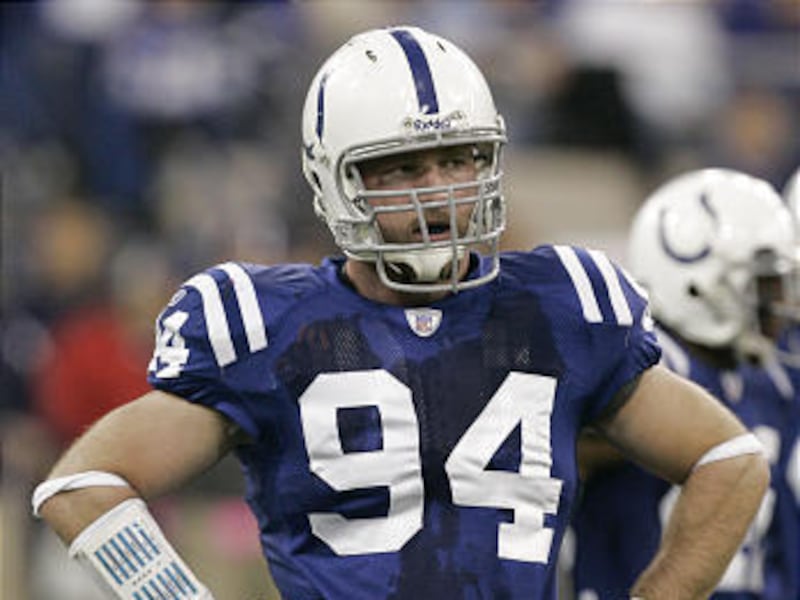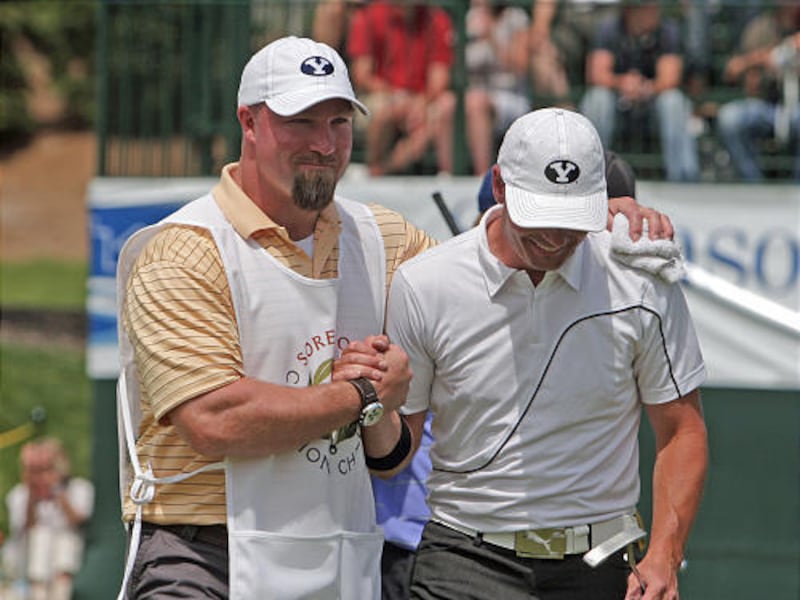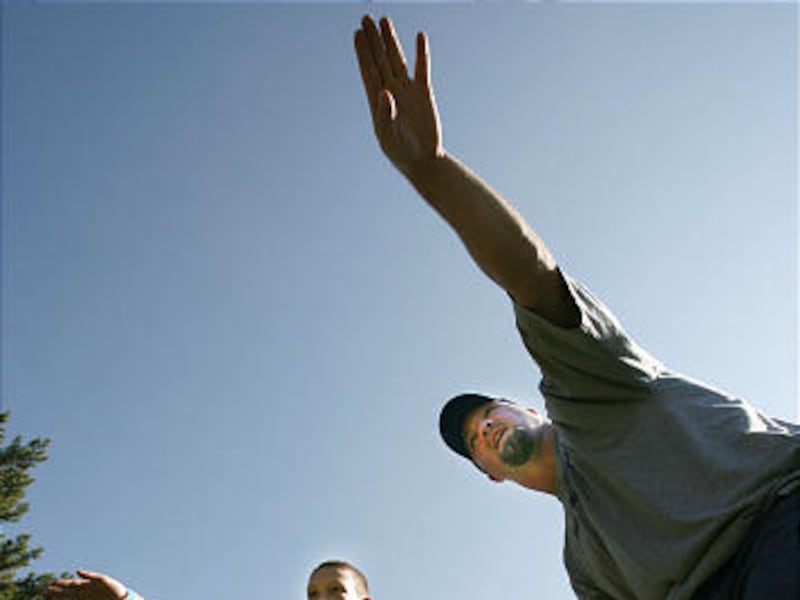HIGHLAND — When he was an All-American middle linebacker at staid, button-down BYU a decade ago, Rob Morris carved out a reputation for being outspoken, flamboyant and a little crazy.
Aside from being regarded as one of the best defensive players in school history, Morris craved the spotlight, regaling reporters with his antics, such as taunting 8-foot alligators while on vacation in Florida.
The BYU media relations department nicknamed him "Freight Train" to promote him for the Butkus Award. Once, after scoring a touchdown on a 51-yard interception return, he celebrated by performing a "snow angel" in the end zone grass. He publicly criticized the school's Honor Code Office for the way it handled disciplinary issues involving non-LDS athletes.
These days, having retired this past summer after a checkered eight-year National Football League career with the Indianapolis Colts that included a Super Bowl championship, Morris has mellowed. Life can do that to a guy.
While eating lunch recently in Highland, where he lives with his wife, Tracie, and 5-year-old son, Carter, Morris admits he has changed since he finished playing at BYU in 1999.
"A lot of that was building a reputation in college that matched football. Not that I was being fake, or that it wasn't me," says the Colts' first-round pick in 2000. "To some extent, I was like that.
"Now, I'm more harnessed. I realize that sometimes it's not always the best to say the first thing on your mind. People see me all the time and I'll be talking to them for a few minutes and they'll be like, 'Who is this?' I guess I'm more humble, more meek. That's growing up.
"A lot of that was me building this image," Morris said. "I loved the media attention. When I got to the NFL, it was just the opposite. I didn't want to do interviews. I wanted to be hidden and unnoticed. In Indianapolis, we have a lot of star power there (like quarterback Peyton Manning). I was way down on the rung of stars. And I liked that."
Not that Morris transformed into a wallflower. He remains candid and opinionated, with a quick wit and a wry sense of humor. Besides maturing, the 33-year-old Morris — who sports a shaved head and a goatee — is evolving. Now, he's a regular Mr. Mom. His days are filled with doing household chores while Tracie, who is 23 weeks pregnant with a baby girl, is on doctor-prescribed bed rest.
"She's had a lot of physical problems," Morris says of his wife. "She's a trouper, though. She's tough. Right now, I'm mostly trying to do laundry and dishes and taking care of my son while she's been sick. She's been on bed rest for close to two months already. She's probably got another three to go.
"I haven't tried to jump into post-career or anything. I'm just taking care of the family. Hopefully, I'll get to have some sort of retirement party and maybe go on a trip to Europe after the baby comes, I don't know. I enjoy being home with my family."
Then he pauses and smiles. "I don't always enjoy doing the dishes."
During his football career, Morris loved hitting opposing ball-carriers. Along the way, he learned the game — and life — can hit back.
While the Colts were marching toward the Super Bowl during the 2006 season in what could be considered the pinnacle of Morris' football career, he and his wife were dealing with a profound personal loss.
In week nine, when the Colts played at New England, it was reported in the Indianapolis newspapers that Morris was out because of a hamstring injury. In reality, he missed that game so he and his wife could travel to Highland to bury their triplets, who died 20 weeks into Tracie's pregnancy.
"Nobody really knew about it, except for people in my (LDS) ward back there," he says, talking about the experience publicly for the first time. "I really didn't want my personal business out there (in the media). We flew back to Highland and had a little ceremony here at the city cemetery.
"The Super Bowl was a blessing because we came back, and people wanted to talk about the Super Bowl."
Now that his wife is pregnant again, memories of losing the triplets are close to the surface.
"I think about that all the time," Morris says. "We have a great doctor up at the University of Utah Hospital. So there's something good that can come out of the U., contrary to what I always believed.
"We go up there every other week. The pre-term stuff, they really don't know why or how. You just cross your fingers. My son was born early and then we lost the triplets. We're fighting to keep this one in as long as we can."
The Colts ended up defeating the Chicago Bears in the Super Bowl XLI in February 2007, but he can put that achievement in perspective.
"It's a big deal. I won a Super Bowl. Is it the most important thing? No. Is that the crowning achievement of my NFL career? Not really. The crowning achievement of my NFL career is overcoming some of the adversity and people saying, 'You stink. You're a first-round pick, and you're hurt all the time."'
Yes, the road to the Super Bowl was filled with detours. Was the journey worth it?
"Sure. I learned a lot from those experiences," he says. "I think I learned more from the struggles and tough times I had than I did from the good times. That's what I'll take away from the NFL.
"Obviously, the Super Bowl was great and that was kind of the culmination. I had been a starter, then I was relegated to special teams play. Then I was inserted as a starter into a new position. I really thrived there, won a Super Bowl, got a new contract, then got hurt. So, there have been peaks and valleys. Just like life."
In 2000, Morris was selected in the first round, No. 28 overall, by the Colts. At the time, Indianapolis was a young team on the rise, looking to shore up its defense and setting its sights on the Super Bowl. On draft day, Indianapolis had already projected him as the starter at middle linebacker.
But Morris missed most of training camp as a holdout and, midway through his rookie season, he ruptured a tendon in his right knee against New England. It sidelined him for the rest of the year, and it seriously impacted the rest of his career.
"I ruptured my quad, which hooks onto the knee. I snapped it off," Morris says. "It affected me big-time. I spent every bit of three years recovering from it. The year after I came back, I broke my kneecap on the same leg. The rehab was tough. I was four years into the league until I felt relatively healthy."
Being a first-round draft pick, with the accompanying high expectations, wasn't all Morris had hoped it would be.
"It stunk," he says. "I came into the league and got a brutal injury my rookie year. People expected me to recover in three months because I was a first-round pick. People are impatient."
Last fall, seven years after suffering a ruptured tendon in his right knee, Morris sustained the same injury — to his left knee.
"It's a pretty uncommon, random injury. And it's pretty serious," he says. "It was just a freak thing. I've only heard of only two other guys in the NFL that have done that."
Today, he bears twin battle scars on each knee where the surgeries were performed, serving as symbolic bookends to his pro career.
Morris finished the 2007 season on the injured reserve list, and the team terminated his contract last February after a failed physical. But Morris recovered from the injury and, as recently as two months ago, Colts' team president Bill Polian had discussions with Morris about returning for a ninth NFL season.
In the end, after evaluating his family situation and his physical capabilities, Morris quietly opted to retire.
"It was time. Physically, I couldn't do it anymore," he says. "My knee wasn't getting to where I wanted it to be. I can't get it all the way straight. When I was 25, no problem. At 33, big problem. Physically, I just couldn't do it. It was a hard decision."
One of those whom Morris confided in while trying to decide his future was BYU coach Bronco Mendenhall.
"I actually went to Bronco and sat down with him a couple of times," he says. "He gave me some great advice."
When Mendenhall was hired almost four years ago, Morris wasn't sure Mendenhall was the right man for the job. Morris was also disappointed that the job didn't go to longtime BYU assistant Lance Reynolds, another candidate who remained on staff after Mendenhall's promotion to head coach.
"In the beginning, I didn't know Bronco," Morris says. "I knew Lance Reynolds. I was a big Lance Reynolds fan. When (Mendenhall) came in with, 'We're going to bring in the right guys and high character guys,' I thought, 'You're not going to win a lot of games, either.' I was one of the naysayers."
Now, Morris is happy to see the Cougars return to national prominence and ranked in the top 10.
"Bronco earned my respect. I'm fully invested, as they say," Morris says. "I'm a believer. He's doing it the right way with the right people."
This fall, Morris has attended a couple of BYU home games — the 59-0 shellacking of UCLA and the 44-0 crushing of Wyoming. Morris took his son to the Wyoming game but left early.
"Three minutes into it, after his cotton candy ran out, my son said, 'Dad, let's go. It's too hot out here,"' he says. "A normal 5-year-old. We left after the first quarter and got Slurpees."
For Rob Morris, after all, family comes before football.
Rob Morris career highlights
BYU (1993, 1997-99)
• Was a semifinalist for the Butkus Award, emblematic of the nation's top linebacker
• Earned first-team All-America honors by the Associated Press, Sporting News and the Football News
NFL (2000-2007)
• Was selected in the first round (No. 28 overall) by the
Indianapolis Colts
• Started at middle linebacker for the first five years of his career
• Received NFL's Ed Block Courage Award in 2002
• Was the Colts' leading special teams tackler in 2006
• Started nine games for Indianapolis in 2006
• Helped Colts win Super Bowl XLI
E-mail: jeffc@desnews.com




